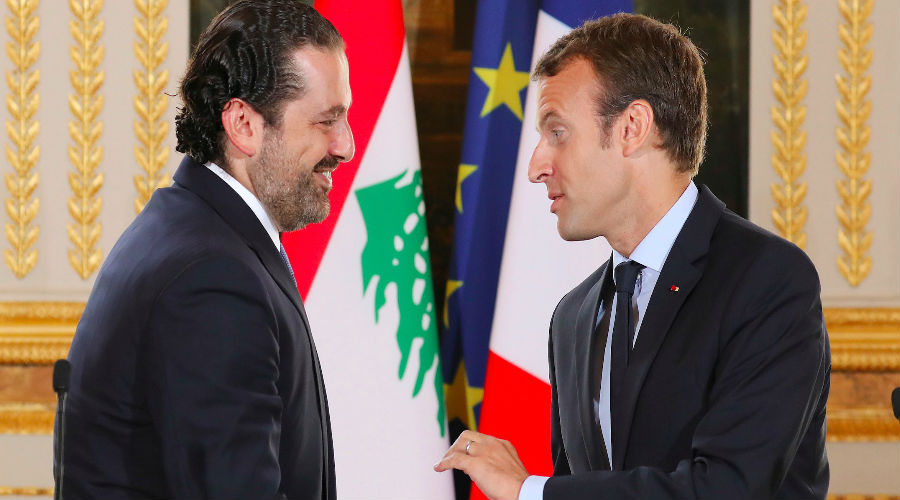In the wake of the sudden resignation of Lebanese Prime Minister Saad Hariri on November 4, France played a key role in resolving the crisis that ensued from that resignation, which raised many questions and objections that mounted to anticipating an imminent regional war. Paris spared no effort to resolve it, beginning with the official statements stressing the need for stability of Lebanon, then the visit of the French President, Emmanuel Macron, on November 9 to meet the Crown Prince of Saudi Arabia, Mohammed bin Salman, then the French Foreign Minister, Jean-Yves Le Drian, went to Riyadh to discuss the situation with the Crown Prince. The French mediation culminated in the visit of Hariri and members of his family to Paris on November 18. Following that visit, Hariri returned to Lebanon and rescinded his resignation.
Reasons for Mediation
There are several reasons behind the French mediation to resolve the crisis of the resignation of Lebanese Prime Minister Saad Hariri. The most prominent of which are the following:
1- To restore France’s leading role in the region through mediation efforts relying on its close ties with the three main communities in Lebanon (Sunni, Shi'ites and Maronites), in addition to its privileged relations with the Kingdom of Saudi Arabia, in particular, and the GCC countries in general.
In this context, Donnie Bouchard, expert on Middle Eastern issues at the French Institute for International Relations, states that the role of Paris will be the most acceptable in the current period, at a time when the US foreign policy raises concerns, coupled with a British retraction due to the Brexit, and Germany’s retreating role -to some extent- due to its domestic policy.
2- Hariri holds French nationality and has extensive contacts with French political circles and businessmen.
3- The French role in the Lebanese crisis was widely accepted at home, an additional reason that pushed Macron to mediate, especially the support of far-right leader Marine Le Pen. This comes in light of the traditional beliefs of the National Front (FN) that the interests of minorities in Lebanon should be protected, especially Christians, and that Paris should play a key role in calming any sectarian strife. According to Le Pen, maintaining Lebanon’s stability is essential for the preservation of minorities there, as well as backing a predominantly moderate-Islamic state in a region where the dominance of radical and extremist movements is growing.
4- The good relations between France, on one hand, and Saudi Arabia and Lebanon, on the other, did not hinder Macron and his foreign minister, Jean-Yves Le Drian, to establish extensive contacts with Iran in order to contain the crisis. Thus, absence of genuine regional opposition to the French role encouraged Paris to act as a mediator despite the astonishment of Supreme Leader’s senior advisor for international affairs, Ali Akbar Velayati, for the expanded French role in the crisis.
Mediation Approaches
France has adopted many approaches and procedures in order to play the role of mediator in the best way, including:
1- Macron declared that he would meet Hariri as the Prime Minister of Lebanon, not as an exiled or a fugitive, lest he angers some countries such as Russia and China. In this regard, Christoph Kastner, spokesman for the French government, announced that Macron encouraged Hariri to make any decisions he deems appropriate, but he should do this in his homeland, Lebanon. The aim of this mechanism is to dispel any suspicion that would accuse French leaders of interfering in the affairs of other states.
2- Assigning the implementation of an action plan to high-level officials specialized in Lebanese affairs, one of the important mechanisms used by Paris before and while taking steps in the crisis. Such a mechanism is prevalent in democratic states in general, as the decision-making process is not confined to the president, although he has the supreme authority to take final decisions.
In this context, Macron enlisted the help of the head of the external security department Bernard Emie, a former ambassador in Beirut, to issue statements and devise strategies to deal with the crisis. He also obtained detailed information on the main actors of the crisis in his consultations with Aurélien Le Chevalier, the second man in the hierarchy of French diplomacy and the director of the French Institute in Lebanon from 2010 to 2013. The French president also sent Le Chevalier to Beirut in early November to bridge the gap between the views of different communities in Lebanon aiming to ease the tension among them.
The French crisis management mechanisms have been highly efficient, culminating in the return of Hariri to Lebanon and the reconsideration of his resignation.
Mediation Outcomes
As mentioned previously, the French mediation has led to easing the tensions through the return of Saad Hariri to Lebanon and holding talks with Lebanese President Michel Aoun concerning the future of the regime of governance.
On the regional level, Saudi Arabia welcomed the return of Hariri to Lebanon through its Foreign Minister Adel al-Jubeir, who praised the French efforts in that regard. In the same vein, the Egyptian president, Abdel Fattah al-Sisi, reiterated his appreciation for the efforts of Elysee.
The most prominent outcome of the French mediation is to solve the crisis of the resignation of Saad Hariri without any escalatory measures from Iran's side. Unlike the anticipated, Tehran accepted the mediation, despite the fact that Hezbollah is biggest loser of the crisis. Hezbollah finds itself in a bind after the international community has ascertained that it has begun to exclude Hariri, whether politically or attempting to liquidate him physically, and has already been accused of any unrest that might affect Lebanon.
In conclusion, the root causes of the Lebanese crisis are historic and cannot be ascribed to Hariri's resignation solely. It is attributed to deep sociological problem, not just a political one that can be resolved in the corridors of governments and parliaments.


